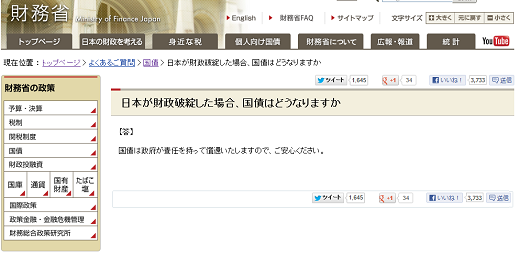This has got to be the icing on the Japanese cake. The otherwise bland website of the Japanese Ministry of Finance, more specifically the FAQ page on government bonds, has been catapulted to stardom on Facebook and Twitter. Not in a good way. As you flip through the MoF’s website, page after page, you will mostly see zero Facebook likes and zero tweets. Social media and the MoF ignore each other.
But go to the FAQ page, skip down past the categories of Budget, Taxation, and Tariffs to item 4, Government bonds. Under the second group, skip past Tax questions for individuals, Miscellaneous (Is it a crime if I make a copy?), Price and yield questions, and Coupons to the infamous question 5: “In case Japan becomes insolvent, what will happen to government bonds?“
Tweeted 1,645 times, liked on Facebook 3,733 times!
The MoF website isn’t some blog to be ignored (at your own risk) but the official voice of the most important ministry of the most indebted country in the world, whose debt will reach 240% of GDP by the end of this fiscal year. The country borrows over 50% of every yen it spends, and it spends more every year. With no solution in sight. Other than more borrowing. Certainly not cutting the budget, which would be too painful. It wouldn’t be enough anyway. Even cutting the budget in half would leave a deficit. And the recently passed consumption tax increase? It will raise the tax from its current 5% to 8% in 2014 and to 10% in 2015, way too little to deal with the gigantic problem, and years too late. Yet it won’t kick in unless GDP grows at least 2% per year—which has practically no chance of happening.
No, there is no longer a good solution. And everyone knows it.
About 95% of Japan’s debt is held within Japan by government-owned institutions, the Bank of Japan, banks, companies, pension funds, and directly or indirectly by individuals. Hence the question—”In case Japan becomes insolvent, what will happen to government bonds?”—is of primordial importance to just about all Japanese adults.
The question and its answer weren’t decided by some underling. Each word was carefully weighed by experts in the highly hierarchical bureaucracy of the MoF. As these words were polished and examined for every nuance, they were passed up the ladder until they landed on the desk of an official at the very top who approved not only the wording, but also whether or not that question should even be on the website. And the official answer is:
“Rest assured that the Japanese government will redeem the bonds responsibly.”
Here is a screen shot of the question and answer:
“Rest assured!” How bondholders can possibly rest assured under these circumstances remains a mystery, in particular since the MoF then proceeds to tell them exactly how they will get kicked in the groin: bonds will be redeemed “responsibly.”
Not when they mature, but responsibly.
Thus, we have the MoF’s official action plan for the moment when the big S hits the fan, the moment when Japan with its declining wages and shrinking working-age population can no longer save enough to mop up all the government bonds necessary to keep the government afloat.
A selective default. Bonds will retain their “value,” but the government won’t redeem them when they mature. It will redeem them in bits and pieces, stretched into all eternity, as it sees fit. You’ll die before you’ll see your money.
This is THE answer, the official answer we’ve been looking for all along, and now we find it on the MoF website where it would have remained hidden in plain sight had not some enraged Japanese spread the word via Twitter and Facebook.
And they filled the ether with caustic FB comments:
- “LOL!”
- “Isn’t it called ‘insolvent’ because you can’t pay?”
- “This is absolutely nothing but mocking the general public. How dare they say such gibberish!?”
- “Should be a joke.”
- “Isn’t it supposed to go, ‘Rest assured that the Japanese people will redeem the bonds responsibly?’“
- “Yeah, the only thing they could rely on is the people’s savings….”
When the legendary savings of the Japanese are drying up, as they’re in the process of doing, the word responsibly will take on a new meaning within the context of one of the greatest recent acts of governmental irresponsibility: creating that debt monster in the first place.
And here is my first foray into Japan—a “funny as hell nonfiction book about wanderlust and traveling abroad,” a reader tweeted. Read the first few chapters for free…. BIG LIKE: CASCADE INTO AN ODYSSEY, at Amazon.
Enjoy reading WOLF STREET and want to support it? You can donate. I appreciate it immensely. Click on the beer and iced-tea mug to find out how:
Would you like to be notified via email when WOLF STREET publishes a new article? Sign up here.
![]()



How shall we measure all this craziness?
"The Myth of Japan's Lost Decades"
http://mises.org/daily/5170/The-Myth-of-Japans-Lost-Decades
"Rest assured"…."Japanese government"…"responsibly"..
Mumble..Fukushima..mumble..LOL…
The Japanese term "sekinin o motte" means "taking responsiblity." A better translation would be "The Japanese government will take full responsibility for redeeming the bonds." No mention of maturity, however.
This might sound crazy after all I am an ex engineer and be lucky to balance a check book
hey wait I've never balanced a check book. I run on faith. Ok why not as each year goes by they just
shave off all the numbers equally. sounds funny but at least its not a crash of numbers.
Visit my website where i solved the JFK murder. And warn you about Cancer risk and GMO
How to know which product are gmo by the PLU.
Watch a video of a english taxi driver " what I would do as primeminister" Halarious
jonkirby2012.wordpress.com